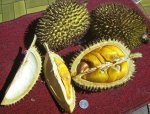The concept of using fruits as batteries has been around for a very long time – but a team at University of Nottingham Malaysia Campus are taking it to a whole different level.
A lemon battery is a device that features in many school projects. The energy for the battery is not in the lemon as such – the electricity is generated by the chemical reaction from electrodes placed in the lemon that react with the fruit’s citric acid.
A team of researchers at University of Nottingham Malaysia Campus (UNMC) is approaching the “fruit” battery from an entirely different angle. According to an article on SciDev.Net; bamboo, coconut shells and the skin of durian fruit can be turned activated carbon; which among other things is used in the construction of batteries known as ‘supercapacitors’.
Supercapitors are energy storage devices able to deliver large amounts of energy in a short space of time and can be recharged much faster than deep cycle batteries. Supercapacitors also have a far longer serviceable life than other current battery technologies; meaning less battery related waste.
The researchers believe the process will cut the material cost of producing battery components by up to 30 per cent. As activated carbon is often made from coal, using fruit and other crop waste materials will provide a cleaner, renewable source of material, with the potential of generating income for farmers.
UNMC has also recently officially opened a super capacitor pilot plant at The University of Nottingham Malaysia Campus site. The Sahz-Nottingham NANO Super-capacitor Pilot Plant will produce supercapacitors for solar energy storage, mobile and electric vehicle applications. The products will be commercialised under the Enerstora brand.
Image credit: Wie146












































